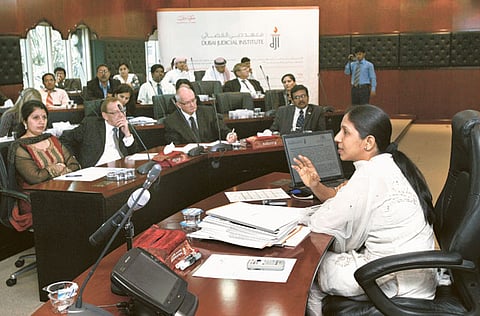Courts must use stringent laws against domestic violence
Dubai Courts should take cognisance of a stringent legislation against domestic violence, lawyers urged

Dubai: The Dubai Courts should take cognisance of a stringent legislation against domestic violence while adjudicating family disputes as per Indian laws, lawyers from the sub-continent have urged.
"When the courts are looking at other sections like the Hindu Marriage Act 1955 and Indian Divorce Act 1869 while adjudicating family disputes as per the Indian law in the UAE, they should also look at connected legislations like the Protection of Women from Domestic Violence Act 2005," said Musthafa Zafeer, Senior Partner of international law firm Musthafa and Almana in Dubai.
As things stand, Indians can only invoke personal laws related to family disputes in the UAE in order to get relief under the Indian legal system. The implementation of the Domestic Violence Act would require special provisions as it is a criminal law, said Bindu S. Chettur, lawyer, Mohammad Salman Advocates and Legal Consultants. "If such a provision comes about, it will be helpful to Indians living here," she said.
The Domestic Violence Act is necessary as it is a powerful deterrent against abuse by husbands, which might be physical, sexual, verbal, emotional or economic, Almana Zafeer, Partner, Musthafa and Almana, said. One of the benefits of the act is that it allows for instant relief like the woman's right to secure housing, she said.
"The act allows woman to reside in a matrimonial or shared household, whether or not she has any title or rights in the household," she said, adding that this right is secured by a residence order passed by the court. She said another benefit under the act is that the court can pass protection orders that prevent the abuser from aiding or committing an act of domestic violence against the woman, entering her workplace or any other place frequented by her, attempting to communicate with her, isolating assets used by both parties or causing violence to her relatives and others who assist her.
Under the law, the accused can be made accountable for providing monetary relief to the aggrieved and her children, besides paying compensation damages.
A breach of the protection order is a cognisable and non-bailable offence, punishable with imprisonment up to one year with fine. The accused can also be tried for offences under the Indian Penal Code and Dowry Prohibition Act. "In our experience, we are seeing 10-15 potential cases of divorce each month, up by 50 per cent from last year," said Almana, adding that 60 per cent of them were Indians. In many of these cases, the wives have alleged abuse by the husband or his parents, she said.
According to the Dubai Statistics Centre, 196 divorce certificates were issued by the Dubai Courts in the last quarter of 2010, up from 178 in the third quarter.


